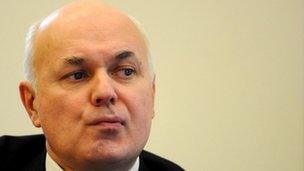The moral certainty of Iain Duncan Smith
- Published

Mr Duncan Smith's faith in universal credit rubs off on colleagues
Never let it be said that Iain Duncan Smith lacks chutzpah.
His department has been accused of having weak management, ineffective control and poor governance; a fortress mentality, a "good news" reporting culture, a lack of transparency, inadequate financial control, and ineffective oversight. Oh, and he has also blown 34 million of your and my hard-earned tax pounds on a dodgy computer system.
But with a confidence that few Cabinet ministers possess, the work and pensions secretary has blithely rebuffed all criticism of his much-loved universal credit.
The excoriating National Audit Office report, he says, is based on historic data. He has already acted to fix the problems. Civil servants - in whom he lost faith - have been sacked and he has brought in new people including the guy who built the Olympic stadium. The scheme, he says, is working and it will be introduced on time.
Now you might expect there to be widespread worry across Westminster at the NAO's devastating analysis of one of the government's flagship policies. Apart from trying to fix the economy, one of the key tasks this government has set itself is to reform welfare. The changeover to universal credit will affect millions of people. A huge amount is riding on this. And yet there appears to be no flood of concern flowing through government ranks today.
Here are a few reasons why:
1. The Tories in general and David Cameron in particular have placed huge trust in Mr Duncan Smith. Such is his faith and self-confidence that a little rubs off onto others. When the quiet man says don't worry, they believe him.
2. The coalition government is confident that it is on the right side of the welfare argument. Ministers believe that their cuts and reforms to make work pay are popular and will over-ride any technical concerns.
3. Labour's critique of universal credit is tempered. The opposition is concentrating its fire on failures in the delivery of the scheme, not any flaws in the principle. Note that the Shadow Work and Pensions Secretary Liam Byrne said Labour in office might well support the reforms if they were working. And, of course, Labour has a somewhat difficult record to defend when it comes to failing government IT projects.
4. The real test of the success or failure of universal credit will come after 2015. Any concerns that are expressed now have yet to filter through to most voters. Some claimants may be worried about what they think may happen to their benefits. But most still get their benefit as usual. If that were to change, if people were to receive less or experience delays or fall into debt, such as happened with tax credits, then we would be in a different place.
That said, there is not universal insouciance across government. Both the Treasury and the Cabinet Office are now involved, checking business cases and signing off budgets. Some wonder quietly if Mr Duncan Smith's zeal and moral certainty makes him at time blind to legitimate criticism. And there are many fingers being crossed up and down Whitehall.
Either way, the concerns about universal credit are no longer leaked by officials to the Sunday newspapers, they are now in black and white. The potential rewards of this reform are great. But so too are the risks.